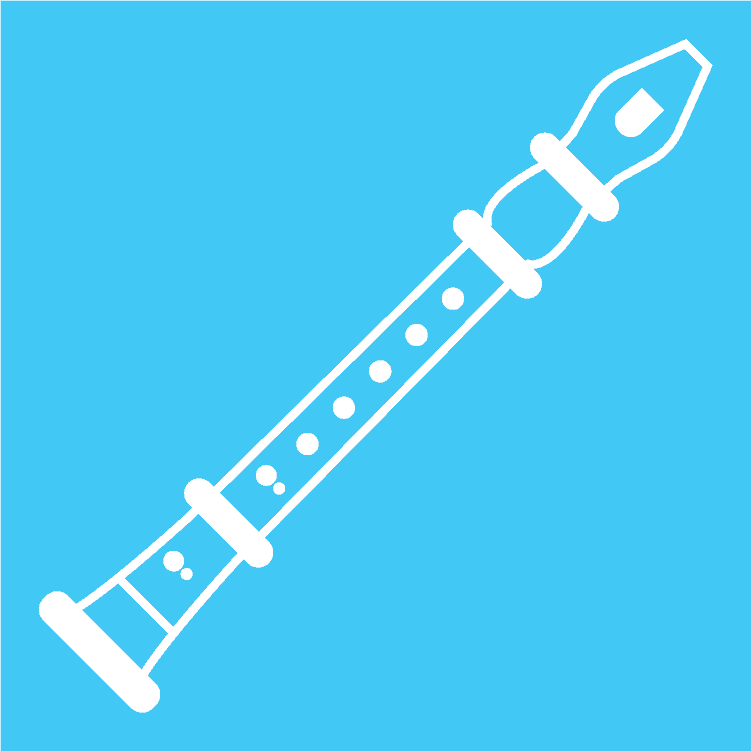Recorder FAQ's
Frequently Asked Questions
The recorder is an excellent instrument for beginners, and we hope you’ve appreciated the remainder of our ‘Beginner’s Guide To Learning The Recorder’ series.

Choosing An Instrument
Wooden or plastic recorder?
As cliche as it may sound, the real answer is, it depends. Both types of recorders have good and bad ones and it’s up to you to choose which one fits your needs and budget the best. As a rule of thumb, though, you must always choose a good wooden recorder over a good plastic one. Always. It’s because of their sound and overall quality. A lot of musicians say that you can play with more feeling and dynamics on a wooden recorder compared to a plastic one. They’re also often easier to play, especially on the lowest notes.
What’s the difference between an F and C recorder?
The F recorder is an alto, and the C is a soprano. That’s the shortest answer. The long answer is this: on an alto recorder, closing all the holes produces an F note. The same goes for the soprano counterpart, which produces a C note. This is also the case for tenor and bass recorders, with the former being a low C and the latter being a low F.
What makes a good recorder?
First things first, brands. With recorders, going cheap means you get what you pay for. So don’t cheap out, and instead go for brands that have a good reputation, such as Yamaha, Aulos, or Stagg. A beginner looking for either an alto or soprano recorder is advised to go for a so-called “wood grain” plastic recorder. The reason is simple: your playing will eventually improve. And when it does, that’s when you would require a higher-end wooden recorder, because even the best plastic recorders won’t keep up with your improved skills.
Maintenance
Should I oil my wooden recorder?
Every recorder player knows this: you must oil your instrument regularly. This is because the instrument itself is at the mercy of all nasty things: your spit, dirt, and other natural conditions. You would not want those to build up on your instrument. So that’s where the oil comes in. Plastic recorders don’t need much oil, but wooden ones do, and regularly so. Oiling keeps the sound beautiful and the recorder itself responsive to your playing. Without oil, the wood will swell and dry, affecting the sound in a bad way.
How do I repair a loose block?
If your recorder’s block comes loose, you’re in trouble. But that doesn’t mean it’s helpless! On a typical wooden recorder, two different types of wood are used for the body and the block. You can try to repair the block yourself, but it is always recommended that you get your instrument to a technician immediately. They have all the tools and skills necessary to either save the original block or fit a new one. In other words, don’t try to repair a loose recorder block if you’re not sure how to.
How do I clear my recorder’s windway?
Clearing your recorder’s windway is quite easy. Blow into the window while tightly covering the opening of the headjoint with your other hand simultaneously. Any additional moisture will be expelled at the beak, where you can wipe it off. Never, ever place your finger on the labium, which is where your lips go. Over many hours of playing, that labium is likely moist and elastic. If it is, then it’s weak and even the slightest force could bend it and change its angle.
Why should I warm the recorder before using it?
If you don’t warm the recorder beforehand (i.e. playing it “cold”), it will stress the recorder’s body enough that it will produce cracks. Nobody wants that to happen. Warming up the instrument prevents that by putting the recorder’s temperature up to par with that of your breath, which is usually warmer than the ambient temperature of your surroundings. Remember to always prioritise warming the head joint, as this is the most vulnerable part of the recorder.
Technique
Should I choose German or Baroque fingering?
Always remember that at your first purchase of a recorder, you have to choose between these two fingering techniques. Here’s the most important thing to know: German fingering tends to be easier for beginners than the Baroque. For instance, fingering the F note on a soprano recorder is easier if you go for German. But there’s a major catch: with this ease of fingering comes tuning troubles. It will be harder to tune the recorder into any key besides the home key. In other words, you will have to trade fingering ease for tuning issues. The choice is yours at the end of the day.
Why is my recorder sounding high-pitched?
It’s almost always dependent on how hard you blow. By doing so, you can engage the instrument’s harmonic which is an octave higher than the note you want to play. You produce this because you’re forcing the sound to “rebound” on itself due to the extra force. You can avoid this by blowing more gently. This is a common issue with beginners because they tend to think that they require a lot of air. The best option is to breathe steadily despite feeling the pressure from the instrument as you blow.
Can I play a recorder left-handed?
The short answer is yes. Common recorders which are often made for right-handed people can be played left-handed by merely adjusting the positions of the lower and the upper hand. You will then plug the remaining redundant hole with some wax or any other material. But this is only possible for a recorder which has a double lowest finger hole. If there is none, then you can’t essentially “play it in reverse” as a lefty. You’ll have to buy a special left-handed recorder, which can be a bit trickier to find.
About the Author
Chloë Vincent
Chloë is a graduate of the Guildhall School and concert highlights include the BRIT awards with Billie Eilish, The Who at Wembley Stadium and performing for the Queen at Buckingham Palace. Chloë regularly records at studios such as Abbey Road, working for artists such as Kanye West, Madonna and Michael Kiwanuka as well as film sessions. Orchestral work covers tours of China and Japan and performing at the Musikverein in Vienna. Chloë lives in Oxfordshire with her trumpeter husband and enjoys cooking and playing board games in her spare time.
Twitter - @chloeflute
Other posts by this author
Twitter - @chloeflute
General
What instruments and methods are great in getting kids interested about playing recorders?
It depends on you! But the truth is, getting children interested in playing recorders is quite easy if you start them young. Like a family tradition, for example. Two musically inclined parents can give the kids a sense of fun playing music, and the recorder is a good instrument for them to get started on learning the basics at home. The activity can be turned into a family bonding session with the kids and the parents making music together.
What is a recorder?
Let’s get this out of the way: a recorder isn’t something you use to record stuff. In this case, the name refers to a woodwind instrument that looks very much like a flute. It is commonly used to teach music in elementary school due to how easy it is to produce sound on it. The recorder’s history stretches back to the Middle Ages and is a great tool for teaching students about a lot of woodwind musical techniques, like breath control, coordination, and music reading, among others.
Aren’t recorders and flutophones the same?
Not really. The thing is, they might look similar, but they’re definitely not the same. All you need to do is look at the finger holes and at the end of the instruments. If the instrument’s end flares like a trumpet, that’s a flutophone. If it doesn’t, that’s a recorder. A flutophone also has raised finger holes, while a recorder looks like a cylinder with holes bored into it. Remember these when purchasing a recorder for the first time, so you won’t be confused and buy a flutophone instead.
Is a recorder a real instrument?
Barring the confusing name, yes. A lot of people think that recorders are childhood toys because they often encountered it while they were wee little kids in elementary school. But that is not true. A recorder is as serious an instrument as the guitar, trumpet, and even the piano is. The modern recorder only featured a lot in elementary school music education because producing good sound on it is easy enough for children. Yet that still doesn’t take from its merits as a real instrument, as a lot of professional recorder players exist and perform live.
Is it easy to learn the recorder?
We’ve been talking about how easy it is for even children to take up a recorder, so the answer is yes! If kids can do it, adults definitely can, too. It’s easy to start playing. But if you want to master the instrument and sound really good, you’ll have to commit a certain amount of effort to practicing. Fortunately, you won’t have to learn it alone too if you don’t like the “lonely” feeling of self-instruction. There are groups of recorder players out there who would always welcome a newcomer into their fold. The feeling of learning and bouncing ideas off other people can help your playing even more.

Sign Up To Get The 4 Things I’ve Been Using & Loving
4-Feature Friday does exactly what it says on the tin; sends an email every Friday with four of the most extraordinary things I’ve found that week
The e-mail really can be about anything at all; books, music, tracks, gizmos, teaching tricks – as long as it’s pleasurable and interesting and excellent, it’ll finish up on the email!
Only available if you are a subscriber to the newsletter.




